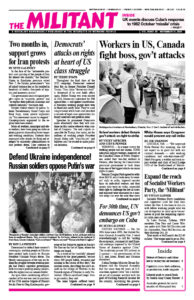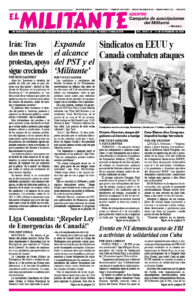TORONTO — In a major victory for working people and our unions, 55,000 education support workers, members of the Canadian Union of Public Employees, ended their two-day walkout in Ontario, after forcing the Conservative provincial government to back down from one of the biggest attacks on union rights in years.
Premier Douglas Ford agreed to withdraw Bill 28, which took away the workers’ right to strike, imposed massive fines on individual workers and their unions who went on strike, suspended their right to challenge the law in court, and imposed what amounted to a massive wage cut over the next four years when inflation is taken into account.
Thousands of education support workers across the province walked off the job Nov. 4 to protest the draconian law and to advance their fight for “a living wage,” determined to stay on the picket lines for “as long as it takes.”
They were joined by supporters from many other unions, parents and students, who took part in over 100 protest actions across the province, together with the Ontario Federation of Labour.
In an impressive demonstration of union solidarity against this attack, some 15,000 people joined a picket line on the first day of the strike in downtown Toronto at Queen’s Park, site of the Ontario provincial legislature. They were joined by union members from the United Steelworkers, Catholic Teachers Federation, Elementary Teachers Federation of Ontario, Unifor, United Food and Commercial Workers, the Ontario Public Service Employees Union and many others. The 8,000 education workers from the Ontario Public Service Employees Union walked out as well.
Fighting for a livable wage and more hiring to better support the 2 million students they serve, the workers — educational assistants, custodians, early childhood educators, librarians, office administrators and many others who keep the schools running — campaigned for weeks before the strike, explaining 39,000 Canadian dollars a year ($29,055) is not a livable wage, especially in face of rising prices.
The Canadian Union of Public Employees members voted by 96.5% for a strike mandate in October. They demanded an across-the-board CA$3.25 per-hour wage increase to keep up with inflation, currently around 7%.
The government claimed the union demands were “outrageous,” and in their bill they imposed a yearly 2.5% wage “increase” for workers who earn under CA$43,000 a year and 1.5% for those who earn more.
CUPE officials pointed out this amounted to a 20% wage cut. The union also said its members’ wages have been declining for years, after a 1% raise imposed by the government in 2019 and the bite of inflation. As a result, education support workers, 70% of whom are women, are among the lowest paid workers in the schools.
In an unprecedented action in relation to a union battle, the government also included in the legislation the “notwithstanding clause” of the Canadian Charter of Rights and Freedoms. By doing this, the Ford government blocked CUPE from challenging Bill 28 in court for the next five years.
Bill 28 also imposed fines on each worker up to CA$4,000 per day on strike and up to CA$500,000 per day on the union. This would have meant a total of over CA$220 million for each day the workers went out.
Dangerous precedent for all workers
The construction laborers’ union — LiUNA —– called the strikebreaking law “a dangerous precedent that aims to erode respect for collective bargaining rights and unionized labour.” Its members were among the 43,000 construction workers who went on strike in May.
Brian Hill, head caretaker at Forest Hill school in Toronto, told the Militant that the government “is making our union rights illegal. They claw at us, break down our unions and divide us. This is the time we need to fight.”
“What good is a union if you can’t use it?” Kim Fallis, educational assistant at General Crerar Public School, said. “Everyone wants the kids in school, but we have not had a substantial increase in years. If they can do this to us, this will spread to other unions.”
In a cynical attempt to influence parents, students, and other working people, the law was misnamed “Keeping Students in School Act.” But workers know they are the ones fighting for better conditions in the schools.
“Taking away the right to strike from education workers was a terrible move by the government. I support the CUPE workers,” grade 12 student Feven Hailemariam told Militant supporters at her family’s door Nov. 5.
A recent poll showed that almost 70% of parents of school-age children blamed the Ford government for the walkout.
In an unprecedented show of solidarity, leaders from more than 20 private and public-sector unions and labor federations joined a celebratory news conference Nov. 7. They announced the government had agreed in writing to repeal the anti-strike law, including withdrawing the imposed contract terms. It was a victory built on the determination of the workers and their tens of thousands of supporters. The unions backing the school workers union had been planning a province-wide walkout and mass protest Nov. 14 if the government refused to back down.
“We have our bargaining rights back,” said Laura Walton, president of the Ontario School Board Council of Unions. She was surrounded by leaders from the Canadian Labour Congress, the Ontario Federation of Labour, Unifor, the United Steelworkers union, the Ontario Public Service Employees Union, the Elementary Teachers Federation of Ontario, among others.
As the press conference took place, 2,200 Amalgamated Transit Union workers, who drive the GO buses vital to commuter transport in the Greater Toronto Area, were picketing on the first day of a strike over job security and safety. A large contingent of transit workers had participated in the Nov. 4 Queen’s Park mass demonstration.
A Nov. 8 editorial in the Globe and Mail bemoaned the workers’ victory. It explained they shared the government’s desire to “moderate wage increases. But Ford’s “nuclear” attack backfired, and the government “weakened itself, undermined its own public support and emboldened public-sector unions.”
School workers began returning to work Nov. 8 in a much stronger position to fight for the wage increase and more hiring they need. CUPE officials made it clear they are prepared to exercise their right to strike again, if needed.
Vicky Mercier is a Toronto teacher and member of the Elementary Teachers of Toronto union.


